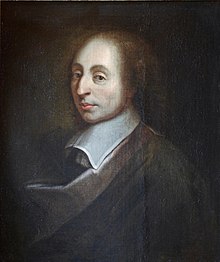
Back Blaise Pascal Afrikaans Blaise Pascal ALS ብለዝ ፓስካል Amharic Blaise Pascal AN ब्लेज़ पास्कल ANP بليز باسكال Arabic باسكال ARZ Blaise Pascal AST Blaise Pascal Aymara Blez Paskal Azerbaijani
Blaise Pascal | |
|---|---|
 Portrait of Pascal in 1691 | |
| Born | 19 June 1623 Clermont-Ferrand, France |
| Died | 19 August 1662 (aged 39) Paris, France |
| Father | Étienne Pascal |
| Relatives | Marguerite Périer (niece) Jacqueline Pascal (sister) Gilberte Périer (sister) |
Philosophy career | |
| Era | 17th-century philosophy |
| Region | Western philosophy |
| School | |
Main interests |
|
Notable ideas | |
| Signature | |
|
Preview warning: Page using Template:Infobox philosopher with unknown parameter "influences" Preview warning: Page using Template:Infobox philosopher with unknown parameter "influenced" | |
| Part of a series on |
| Catholic philosophy |
|---|
   |
Blaise Pascal[a] (19 June 1623 – 19 August 1662) was a French mathematician, physicist, inventor, philosopher, and Catholic writer.
Pascal was a child prodigy who was educated by his father, a tax collector in Rouen. His earliest mathematical work was on projective geometry; he wrote a significant treatise on the subject of conic sections at the age of 16. He later corresponded with Pierre de Fermat on probability theory, strongly influencing the development of modern economics and social science. In 1642, he started some pioneering work on calculating machines (called Pascal's calculators and later Pascalines), establishing him as one of the first two inventors of the mechanical calculator.[8][9]
Like his contemporary René Descartes, Pascal was also a pioneer in the natural and applied sciences. Pascal wrote in defense of the scientific method and produced several controversial results. He made important contributions to the study of fluids, and clarified the concepts of pressure and vacuum by generalising the work of Evangelista Torricelli. Following Torricelli and Galileo Galilei, in 1647 he rebutted the likes of Aristotle and Descartes who insisted that nature abhors a vacuum.
He is also credited as the inventor of modern public transportation, having established the carrosses à cinq sols, the first modern public transport service, shortly before his death in 1662.[10]
In 1646, he and his sister Jacqueline identified with the religious movement within Catholicism known by its detractors as Jansenism.[11] Following a religious experience in late 1654, he began writing influential works on philosophy and theology. His two most famous works date from this period: the Lettres provinciales and the Pensées, the former set in the conflict between Jansenists and Jesuits. The latter contains Pascal's wager, known in the original as the Discourse on the Machine,[12][13] a fideistic probabilistic argument for why one should believe in God. In that year, he also wrote an important treatise on the arithmetical triangle. Between 1658 and 1659, he wrote on the cycloid and its use in calculating the volume of solids. Following several years of illness, Pascal died in Paris at the age of 39.
- ^ Vincent Jullien (ed.), Seventeenth-Century Indivisibles Revisited, Birkhäuser, 2015, p. 188.
- ^ Cite error: The named reference
MCSwas invoked but never defined (see the help page). - ^ Wells, John (3 April 2008). Longman Pronunciation Dictionary (3rd ed.). Pearson Longman. ISBN 978-1-4058-8118-0.
- ^ "Pascal" Archived 6 January 2015 at the Wayback Machine. Random House Webster's Unabridged Dictionary.
- ^ "Pascal, Blaise". Lexico UK English Dictionary. Oxford University Press. Archived from the original on 5 December 2021.
- ^ "Pascal". Collins English Dictionary. HarperCollins. Archived from the original on 14 August 2019. Retrieved 14 August 2019.
- ^ "Pascal". Merriam-Webster.com Dictionary. Merriam-Webster. Retrieved 14 August 2019.
- ^ See Schickard versus Pascal: An Empty Debate? Archived 8 April 2014 at the Wayback Machine and Marguin, Jean (1994). Histoire des instruments et machines à calculer, trois siècles de mécanique pensante 1642–1942 (in French). Hermann. p. 48. ISBN 978-2-7056-6166-3.
- ^ d'Ocagne, Maurice (1893). Le calcul simplifié (in French). Gauthier-Villars et fils. p. 245. Archived from the original on 9 August 2018. Retrieved 14 May 2010.
- ^ Jarrett (31 December 2024). "One of the Greatest Inventions in the History of Human Transport". Human Transit. Retrieved 2 January 2025.
- ^ "Blaise Pascal". Catholic Encyclopedia. Archived from the original on 10 March 2009. Retrieved 23 February 2009.
- ^ Grumball, Kevin Shaun. "Thesis submitted to the University of Nottingham for the degree of Doctor of Philosophy" (PDF). University of Nottingham. Archived (PDF) from the original on 5 June 2020. Retrieved 20 October 2022.
- ^ "Internet History Sourcebooks". sourcebooks.fordham.edu. Archived from the original on 19 October 2022. Retrieved 20 October 2022.
Cite error: There are <ref group=lower-alpha> tags or {{efn}} templates on this page, but the references will not show without a {{reflist|group=lower-alpha}} template or {{notelist}} template (see the help page).